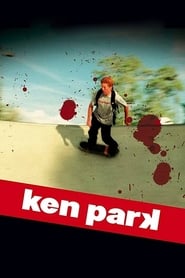“Ken Park 2002” is a raw, provocative film that delves into the dark side of suburban youth. It follows the lives of four teenagers living in a seemingly idyllic California town, where external appearances belie the internal struggles they face. Filled with rebellion, despair, and sexuality, the movie weaves together a tapestry of broken families, societal pressures, and the yearning for connection. Each character battles their own demons as they navigate through a stifling world that masks its secrets behind white picket fences. In this coming-of-age story like no other, “Ken Park 2002” exposes the underbelly of adolescence with startling honesty and unflinching imagery.

CLICK HERE🡇🡇🡇📽️_Watch Ken Park 2002 English Subtitles_
Review
Ken Park: Exploring the Depths of Human Desperation
In a world riddled with despair and longing, filmmaker Larry Clark ventures into the darkest recesses of human existence with his provoking and controversial movie, “Ken Park.” With a raw and unfiltered lens, Clark peels back the layers of American suburbia to expose the angst-ridden lives of its youth.
Set against the backdrop of Visalia, California, “Ken Park” weaves together the narratives of four teenagers – Ken Park himself, Tate, Peaches, and Shawn. Their lives are enmeshed in a web of dysfunctionality and despair, each grappling with their own demons. The movie delves into themes of abuse, sexuality, violence, and ultimately culminates in a tragic climax that leaves audiences reeling.
The news surrounding “Ken Park” has been as polarizing as the film itself. Due to its unflinching portrayal of explicit content involving minors, it faced considerable backlash upon its release. Yet this controversy only served to fuel intrigue among audiences who sought to understand what lay behind the façade of suburban tranquility.
The plot weaves through the characters’ lives as they navigate their troubled existence. From Ken Park’s tragic end to Peaches’ struggle for identity amidst abuse and dysfunction, each character serves as a vessel for Clark’s exploration of desperation’s depths. The fact that these stories are not fabricated but rather drawn from real-life experiences adds an unsettling authenticity to “Ken Park.”
Clark masterfully selects an ensemble cast that brings these characters to life with haunting conviction. Their performances are so genuine; they bleed sincerity onto the screen. As Ken Park stares emptily into the void or Tate battles his inner demons with defiant vulnerability, audiences cannot help but be captivated by their raw portrayals.
Despite its low budget and limited release history due to censorship challenges, “Ken Park” has become a cult classic among cinephiles who seek a departure from typical Hollywood fare. Its gritty and unapologetic style has found resonance, particularly among those who appreciate the art of independent cinema.
The score and soundtrack of “Ken Park” complement its somber mood impeccably. As viewers are immersed in the film’s bleak atmosphere, the haunting melodies resonate deep within, underscoring each scene’s emotional intensity. The music is sparse but poignant, echoing Hemingway’s minimalist approach to storytelling.
Filming “Ken Park” was no easy feat. Clark expertly captures the authenticity of Visalia’s suburban landscapes, infusing each frame with a sense of tangible desolation. The use of natural lighting and handheld cameras adds to the gritty realism that permeates every scene.
Evaluating “Ken Park” requires peering beyond the surface level of discomfort it elicits. It challenges societal norms head-on and forces audiences to face their own preconceptions about youth culture and adolescent sexuality. Its unflinching portrayal may be uncomfortable to some, but it serves as a necessary mirror for society’s hidden underbelly.
Awards have eluded “Ken Park,” likely due to its controversial subject matter rather than its artistic merit. However, critical acclaim has often followed in its wake, recognizing its audacity and uncompromising vision. Although lacking in mainstream recognition, “Ken Park” has carved out a niche as an underground gem.
Cinematography plays a vital role in conveying the raw emotions embedded within “Ken Park.” Each shot is carefully composed to enhance the characters’ psychological states – wide-angle shots emphasize their isolation while extreme close-ups magnify their anguish. This visual language draws us deeper into their world, allowing us to experience their pain firsthand.
Opinions on “Ken Park” span across a broad spectrum – from resounding acclaim to scathing criticism. Some laud Clark’s audacity in tackling taboo subjects that others shy away from. Others dismiss the film as gratuitous and exploitative. But no matter where one stands, “Ken Park” cannot be easily dismissed or forgotten.
Certain scenes stand out in “Ken Park,” forever etched into the viewer’s memory. Whether it is Peaches finding solace in intimate self-exploration or Shawn’s violent awakening, these moments serve as emotional touchstones, leaving an indelible impression.
Gossip swirls around “Ken Park” like moths to a flame. Rumors of real-life inspirations and hidden meanings abound, fueling speculation and intrigue among those brave enough to delve into its depths. But ultimately, it is the film itself that demands attention rather than the surrounding chatter.
Soundtracks can make or break a film, and in this arena, “Ken Park” excels. The melodies enhance the emotions portrayed on screen, amplifying their impact on the audience. From haunting ballads to pulsating beats, each track adds another layer to the already complex narrative.
An analysis of “Ken Park” requires an exploration of its special effects beyond its explicit content. Clark employs a raw and stripped-down style that eschews flashy visual tricks for stark realism. This approach allows viewers to become fully immersed in the characters’ world without distractions.
The development of “Ken Park” reflects Clark’s dedication to authenticity above all else. Drawing inspiration from real-life stories he encountered while working with troubled youth, he seamlessly melds fact and fiction into a powerful narrative that refuses to shy away from uncomfortable truths.
Dialogue in “Ken Park” is sparse but packs a punch when delivered at precisely the right moment. Each line feels deliberate and carefully chosen, offering insight into characters’ thoughts and motivations without unnecessary exposition. This restraint mirrors Hemingway’s trademark brevity while conveying maximum impact.
The crews involved in bringing “Ken Park” to life worked tirelessly behind the scenes to ensure its success – from the casting directors who unearthed unknown talents to the production designers who meticulously crafted each setting. Their contributions are instrumental in creating an immersive experience for audiences.
Criticism of “Ken Park” often centers on its explicit content and controversial subject matter. Detractors argue that it pushes boundaries solely for shock value, devoid of deeper meaning. However, this perspective fails to acknowledge the profound exploration of human despair and isolation that underlies the film’s surface.
The production and editing of “Ken Park” faced numerous challenges due to censorship regulations. The need to navigate around explicit scenes and maintain artistic integrity while adhering to societal conventions posed significant hurdles. But these constraints ultimately added layers of nuance and tension to the final product.
In conclusion, “Ken Park” is a testament to Larry Clark’s unwavering commitment to shining a light on the darkest corners of humanity. Like Hemingway’s writing, it strips away unnecessary frills and exposes raw truths with unflinching honesty. While it may not be for the faint of heart, its impact cannot be denied. Audiences willing to traverse its harrowing depths will find themselves forever changed by this haunting exploration of human desperation.
Technical Data

- Release : 2002-08-31
- Runtime : 97
- Genre : Drama
- Cast : James Ransone as Tate, Tiffany Limos as Peaches, Stephen Jasso as Claude, James Bullard as Shawn, Mike Apaletegui as Curtis
- Crew : Edward Lachman as Director, Edward Lachman as Director of Photography, Jean-Louis Piel as Producer, Larry Clark as Director, Larry Clark as Director of Photography
- Revenue : $447,741
- Budget : $1,300,000
- Company : Busy Bee Productions, Cinéa, Kasander Film Company
- Popularity : 29.878
- Summary : Ken Park focuses on several teenagers and their tormented home lives. Shawn seems to be the most conventional. Tate is brimming with psychotic rage; Claude is habitually harassed by his brutish father and coddled, rather uncomfortably, by his enormously pregnant mother. Peaches looks after her devoutly religious father, but yearns for freedom. They’re all rather tight, or so they claim.
- Tagline : Who are you?
